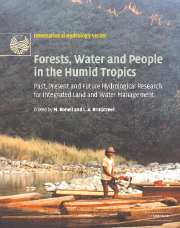 Forests, Water and People in the Humid Tropics
Forests, Water and People in the Humid Tropics Book contents
- Frontmatter
- Contents
- List of contributors
- Foreword
- Preface
- Acknowledgements
- Symposium and Workshop
- Introduction
- Part I Current trends and perspectives on people–land use–water issues
- 1 Trends and patterns of tropical land use change
- 2 The myth of efficiency through market economics: a biophysical analysis of tropical economies, especially with respect to energy, forests and water
- 3 Impacts of land cover change in the Brazilian Amazon: a resource manager's perspective
- 4 Forest people and changing tropical forestland use in tropical Asia
- 5 People in tropical forests: problem or solution?
- 6 Useful myths and intractable truths: the politics of the link between forests and water in Central America
- 7 Land use, hydrological function and economic valuation
- 8 Water resources management policy responses to land cover change in South East Asian river basins
- 9 Community-based hydrological and water quality assessments in Mindanao, Philippines
- Part II Hydrological processes in undisturbed forests
- Part III Forest disturbance, conversion and recovery
- Part IV New methods for evaluating effects of land-use change
- Part V Critical appraisals of best management practices
- Conclusion: Forests, water and people in the humid tropics: an emerging view
- Plate section
- References
5 - People in tropical forests: problem or solution?
from Part I - Current trends and perspectives on people–land use–water issues
Published online by Cambridge University Press: 12 January 2010
- Frontmatter
- Contents
- List of contributors
- Foreword
- Preface
- Acknowledgements
- Symposium and Workshop
- Introduction
- Part I Current trends and perspectives on people–land use–water issues
- 1 Trends and patterns of tropical land use change
- 2 The myth of efficiency through market economics: a biophysical analysis of tropical economies, especially with respect to energy, forests and water
- 3 Impacts of land cover change in the Brazilian Amazon: a resource manager's perspective
- 4 Forest people and changing tropical forestland use in tropical Asia
- 5 People in tropical forests: problem or solution?
- 6 Useful myths and intractable truths: the politics of the link between forests and water in Central America
- 7 Land use, hydrological function and economic valuation
- 8 Water resources management policy responses to land cover change in South East Asian river basins
- 9 Community-based hydrological and water quality assessments in Mindanao, Philippines
- Part II Hydrological processes in undisturbed forests
- Part III Forest disturbance, conversion and recovery
- Part IV New methods for evaluating effects of land-use change
- Part V Critical appraisals of best management practices
- Conclusion: Forests, water and people in the humid tropics: an emerging view
- Plate section
- References
Summary
FOREST PEOPLES AS A PROBLEM?
The treatment of tropical forest dwellers by development organisations has been mixed. Government and international agencies have tended to view forest peoples as, at best, an archaic legacy of a pre-industrial era who have little or nothing to contribute to development and environmental policy. At worst, such populations are perceived as a downright obstacle to progress, or even a threat to national sovereignty, that need to be dragged, screaming if necessary, into the ‘modern’ age. Throughout history, indigenous and other traditional groups have seen their forest resource base come under attack as geographical frontiers have been pushed back in the name of national integration and economic development. The strategies adopted have included highway construction, cattle ranching, small farmer settlement, export crop production, commercial logging and hydropower expansion. Nations such as Brazil, Indonesia and Malaysia, amongst others, have all pursued aggressive strategies of tropical forest occupation in which the needs of the native peoples themselves have been routinely ignored.
Until relatively recently, the social and environmental consequences of such policies were rarely given a second thought by planners and policy-makers. It is no exaggeration to say that forest peoples were (and to a large degree still are) considered expendable in the march towards modernisation and nationhood. Perhaps the clearest indicator of such pressures is deforestation. It is calculated that by 1988 the world had already lost 40% of its tropical forests (Park, 1992).
- Type
- Chapter
- Information
- Forests, Water and People in the Humid TropicsPast, Present and Future Hydrological Research for Integrated Land and Water Management, pp. 75 - 85Publisher: Cambridge University PressPrint publication year: 2005
